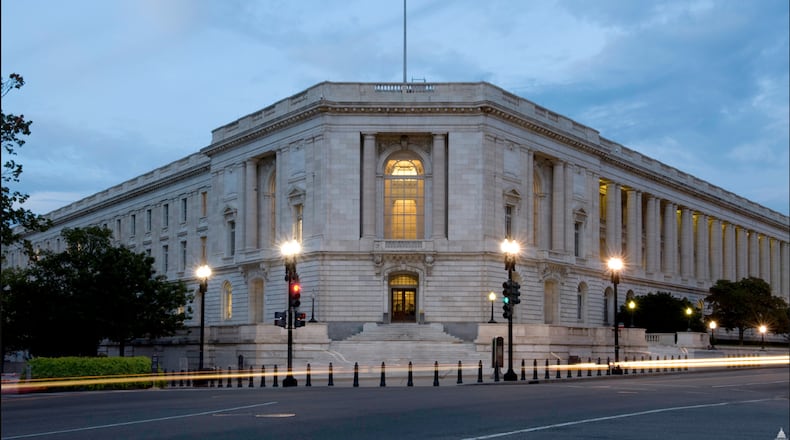Georgia’s two Republican U.S. senators face a difficult decision in the weeks ahead as colleagues seek to rename Richard Russell’s namesake Capitol Hill office building in honor of the late John McCain.
Johnny Isakson, David Perdue and their staffs work out of the elegant Russell Senate Office Building on Constitution Avenue, named in honor of the towering Peach State senator.
They will likely be under immense pressure to back the name change given McCain’s international stature and Russell’s past as a staunch segregationist. But there are others in Georgia who argue that Russell’s political contributions should not be diminished because he was on the wrong side of the civil rights movement.
Within hours of McCain’s death on Saturday, Senate Minority Leader Chuck Schumer, D-N.Y., said he planned to introduce a resolution renaming the building in tribute to the Arizona Republican.
“Nothing will overcome the loss of Senator McCain, but so that generations remember him I will be introducing a resolution to rename the Russell building after him,” he said.
Proposals seeking to rename the edifice have floated around Capitol Hill for years, but Schumer's suggestion quickly picked up steam on Sunday, with U.S. Sen. Jeff Flake, R-Ariz., and House Minority Leader Nancy Pelosi, D-Calif., both offering their support.
Russell, a political legend who served in the Senate for almost 40 years and mentored the likes of future President Lyndon Johnson, has long been a divisive figure.
RELATED: Who is the Russell Senate Building named for?
The Winder native quickly rose to the highest ranks of Georgia’s then-dominant Democratic Party. He was speaker of the state House of Representatives in the 1920s and went on to become Georgia’s youngest governor at 33.
In Washington, he helped create the federal school lunch program and later held a powerful perch as chairman of the Armed Services Committee during two wars in the 1950s and 60s. He was known as the “senator’s senator” due to his mastery of the chamber’s byzantine rules and procedures.
He used that expertise to filibuster the Civil Rights Act in 1964 as leader of the Senate's southern bloc, as well as to oppose other legislation banning lynching and abolishing the poll tax. In 1956 he co-authored the "Southern Manifesto," which sought to oppose desegregation, and sponsored a bill that would relocate African-Americans out of the South.
“This would afford those who support these so‐called civil rights proposals an opportunity to put into practice in their own areas the social order that they find so desirable and which they are attempting to force upon the people of the South,” Russell said of the effort in March 1964, according to the New York Times.
Russell’s name has marked the 109-year-old Beaux Arts-style office building since 1972, with a 7-foot-tall marble statue of him holding court in its rotunda. The building has played host to some of the Senate’s most famous hearings, including investigations into Watergate and the sinking of the Titanic.
At the time of the building’s naming, then-Sen. Sam Nunn said honoring Russell was a “fitting tribute to one of the great personalities in U.S. Senate history.”
But the politics have changed immensely in recent years as statues and monuments honoring Confederate and pro-segregationist figures have sparked intense debate across the country.
Neither Isakson nor Perdue's offices weighed in on the building renaming over the weekend. Both issued statements honoring McCain, with Isakson touting his former colleague's "willingness to reach out to all to do what is right" and Perdue his "wit, wisdom and leadership."
McCain traveled to Georgia to campaign for Perdue in 2014 and Perdue returned the favor two years later when McCain was in a tougher than expected re-election fight.
But both Georgia senators had their share of policy disagreements with McCain over the years, from immigration to health care.
Also silent on Schumer’s resolution was Senate Majority Leader Mitch McConnell, whose blessing would be necessary to move the resolution to the floor for a vote.
Calls to rename the Russell building have surfaced every few years on Capitol Hill, including in 2015, when a Syracuse University professor and an executive for a left-leaning think tank suggested honoring the late Sen. Ted Kennedy instead.
Those campaigns were usually met with silence on Capitol Hill, and Russell’s former aides and boosters have also rallied to the late senator’s defense.
"His colleagues knew they could rely on his integrity, patriotism, intellect, knowledge, diligence and sense of honor," the late Powell Moore, a former Russell spokesman, wrote in an op-ed in the Washington Post in 2015. "He was revered in the Senate."
Former Georgia Congressman Buddy Darden served with McCain in the House, worked as an intern in Russell’s office and now sits on the board of the Russell Foundation. He said he has “nothing but the greatest respect and admiration” for McCain, but he worried about Russell’s legacy being tarnished by removing his name from the Senate office building.
“I think it would be unwise at this point to do it without a lot of careful thought and consideration,” said Darden, who served as a Democrat in the House from 1983 to 1995. “I for one don’t believe in tearing down every monument and trying to change the past. I believe in moving forward.”
Read more:
About the Author
The Latest
Featured



